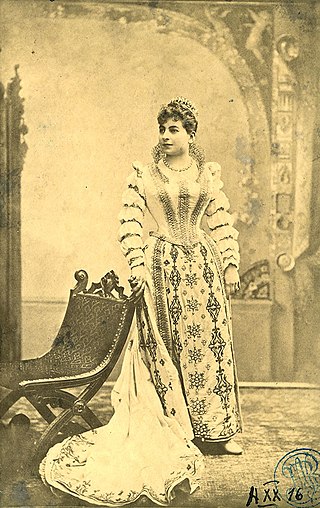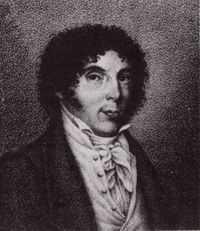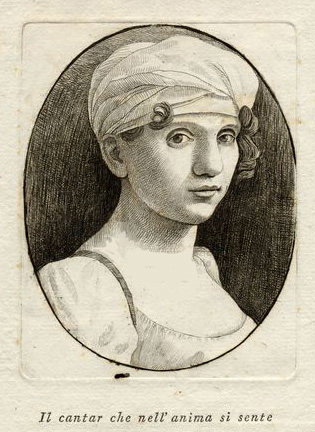
Domenico Gaetano Maria Donizetti was an Italian composer, best known for his almost 70 operas. Along with Gioachino Rossini and Vincenzo Bellini, he was a leading composer of the bel canto opera style during the first half of the nineteenth century and a probable influence on other composers such as Giuseppe Verdi. Donizetti was born in Bergamo in Lombardy. At an early age he was taken up by Simon Mayr who enrolled him with a full scholarship in a school which he had set up. There he received detailed musical training. Mayr was instrumental in obtaining a place for Donizetti at the Bologna Academy, where, at the age of 19, he wrote his first one-act opera, the comedy Il Pigmalione, which may never have been performed during his lifetime.

Don Pasquale is an opera buffa, or comic opera, in three acts by Gaetano Donizetti with an Italian libretto completed largely by Giovanni Ruffini as well as the composer. It was based on a libretto by Angelo Anelli for Stefano Pavesi's opera Ser Marcantonio written in 1810 but, on the published libretto, the author appears as "M.A."

Lorenzo Salvi was an Italian operatic tenor who had a major international opera career during the nineteenth century. He was particularly associated with the operas of Gaetano Donizetti and Giuseppe Verdi; notably singing lead roles is several world premieres by both composers.

Hariclea Darclée was a celebrated Romanian operatic spinto soprano of Greek descent who had a three-decade-long career.

Il falegname di Livonia, o Pietro il grande, czar delle Russie is an 1819 opera buffa in two acts with music by Gaetano Donizetti set to a libretto by Gherardo Bevilacqua-Aldobrandini. The libretto was based in part on Felice Romani's libretto for Giovanni Pacini's opera Il falegname di Livonia, which had just been presented at La Scala in Milan on 12 April 1819. Another source was Alexandre Duval's comedy Le menuisier de Livonie, ou Les illustres voyageurs (1805).

Filippo Galli was an Italian opera singer who began his career as a tenor in 1801 but went on to become one of the most acclaimed basses of the bel canto era, with a voice known for its wide range, extreme agility, and expressivity, and a remarkable gift for acting.

Domenico Reina was a Swiss bel canto tenor, notable for creating roles in the operas of Vincenzo Bellini, Gaetano Donizetti, Saverio Mercadante, and other Italian composers.

Eugenia Tadolini was an Italian operatic soprano. Admired for the beauty of her voice and stage presence, she was one of Donizetti's favourite singers. During her career she created over 20 leading roles, including the title roles in Donizetti's Linda di Chamounix and Maria di Rohan and Verdi's Alzira. She was born in Forlì and studied music there and in Bologna before making her debut in Florence in 1828. She sang in all of Italy's leading opera houses, as well as in Paris, Vienna, and London before retiring from the stage in 1852. She spent her remaining years first in Naples, where she had been the Teatro San Carlo's reigning prima donna for many years, and then in Paris, where she died of typhoid fever at the age of 63. From 1827 to 1834, she was married to the Italian composer and singing teacher, Giovanni Tadolini.

Stefano Pavesi was an Italian composer. He is primarily known as a prolific opera composer; his breakthrough opera was Fingallo e Comala, and his acknowledged opera masterpiece is Ser Marcantonio. He also served as the maestro di cappella of Crema Cathedral from 1814 to 1818, and alone from 1818 until his death at the age of 71.

Antonio Poggi was an Italian operatic tenor who had an active international career from 1827–1848. He is best remembered for creating roles in the world premieres of operas by Gaetano Donizetti and Giuseppe Verdi. He was married to soprano Erminia Frezzolini from 1841–1846.

Elisabetta Manfredini-Guarmani was an Italian opera singer best known for having created the leading soprano roles in four of Rossini's operas, roles which he wrote specifically for her voice. She was born Antonia Elisabetta Manfredini in Bologna and was the daughter of the composer and music theorist Vincenzo Manfredini. After her stage debut in 1810 when she sang in the premiere of Stefano Pavesi's Il trionfo di Gedeone at Bologna's Teatro del Corso, she went on to perform at La Fenice, La Scala, Teatro Regio di Torino, Rome's Teatro Argentina and several other opera houses, primarily in Northern Italy. In addition to the roles she created in Rossini's operas, she also sang in the world premieres of operas by several composers who are lesser known today, including Pietro Raimondi, Simon Mayr, and Ferdinando Paër. Her last known appearance was in 1828 after which there is no further trace of her. The date and place of her death are unknown.

Angelo Anelli was an Italian poet and librettist who also wrote under the pseudonyms Marco Landi and Niccolò Liprandi. He was born in Desenzano del Garda and studied literature and poetry at a seminary in Verona. In 1793 he enrolled in the University of Padua, receiving a degree in Canon and Civil Law two years later. Active in the politics of the Cisalpine Republic in his youth, he was imprisoned twice. His 1789 sonnet on the vicissitudes of Italy under Austrian domination, "La calamità d'Italia", was for a long time incorrectly attributed to Ugo Foscolo.
Vincenzo Galli was an Italian opera singer and impresario. Considered an outstanding basso buffo singer, he created many roles on Italian stages, including in two of Donizetti's operas: Ivano in Otto mesi in due ore and Cesare Salzapariglia in Le convenienze ed inconvenienze teatrali. Luigi Ricci composed the role of Michelotto in his opera Chiara di Rosembergh specifically for Galli's voice.

Teresa "Teresina" Brambilla was an Italian soprano who sang in the major opera houses of Europe in a career spanning 25 years. She was particularly noted for her interpretations of the leading roles in operas by Amilcare Ponchielli, whom she married in 1874.

Fanny Eckerlin (1802–1842) was an Italian mezzo-soprano who also sang contralto roles. During her career she was highly regarded, drawing favorable comparisons to Benedetta Rosmunda Pisaroni, but today she is remembered, if at all, for her association with the early career of Gaetano Donizetti, including creating the title role in his first publicly-performed opera, Enrico di Borgogna.

Nicola De Giosa was an Italian composer and conductor active in Naples. He composed numerous operas, the most successful of which, Don Checco and Napoli di carnevale, were in the Neapolitan opera buffa genre. His other works included sacred music and art songs. His songs were particularly popular, bringing him fame as a salon composer both in Italy and abroad. De Giosa died in Bari, the city of his birth, at the age of 66.
Claudio Bonoldi was an Italian tenor.
Pio Botticelli was an Italian bass-baritone active in the opera houses of Italy from 1810 until the mid-1840s. Amongst the numerous roles he created in world premieres were Pietro il Grande in Donizetti's Il falegname di Livonia and The Caliph in Pacini's La schiava in Bagdad. He also sang the role of Leucippo in the Austrian premiere of Rossini's Zelmira.
Savino Monelli was an Italian tenor prominent in the opera houses of Italy from 1806 until 1830. Amongst the numerous roles he created in world premieres were Giannetto in Rossini's La gazza ladra, Enrico in Donizetti's L'ajo nell'imbarazzo and Nadir in Pacini's La schiava in Bagdad. He was born in Fermo where he initially studied music. After leaving the stage, he retired to Fermo and died there five years later at the age of 52.












